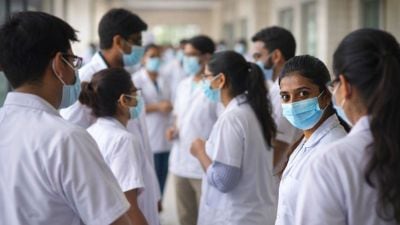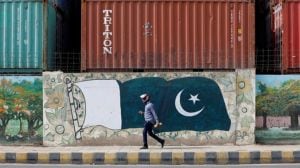Down to Earth
AT dawn, a curtain of cool, blue mist hangs gently over Bashir Mohammed8217;s expansive fields. In the middle of his 60 bigha land in the h...

AT dawn, a curtain of cool, blue mist hangs gently over Bashir Mohammed8217;s expansive fields. In the middle of his 60 bigha land in the heart of Madevi village, three hours from Chandigarh, quilted patches of cauliflower and brinjal grow side by side, lined by rows of guava trees in the distance.
In a Pathani suit, his hair slicked back, 27-year-old Bashir is among the largest vegetable farmers in the erstwhile princely state of Malerkotla, one of the few towns that went unscathed by Partition.
Malerkotla is actually an island of vegetables in a vast carpet of wheat and rice fields. In the mid 8217;60s, while the rest of the state turned to wheat and, later, paddy, this village stuck to its ancient tradition8212;growing organic vegetables.
According to local lore, in the 18th century, a few soldiers from the Afghan invader Ahmad Shah Abdali8217;s army stayed back in the area, gave up arms and ploughed the land for a living. 8216;8216;As far as I can remember, our family has always grown vegetables,8217;8217; says Bashir, as he plucks brinjals with rapid efficiency and stuffs them into a sack.
By 8.30 am, Bashir and his team of 10 have plucked a quintal of taut brinjals. It8217;s nearing 9 am when Bashir8217;s father, Mohammed Babu, a swarthy old man with a warm smile, and his mother, Halima Bibi, arrive on a red motorbike. 8220;We8217;re observing roza,8217;8217; says Halima, as an excuse for being late, before joining Bashir in the work.
The vegetables are dunked into a cement tub to wash away the grainy sand before being fished out and readied for the auction ground at the local mandi 5 km away.
Rs 3,000-crore Farm to Fork project, scheduled to be first implemented in Punjab. 8216;8216;I believe he wants to buy vegetables from the state and then fly them to the Gulf and South Asian countries,8217;8217; he says with a smile.
Bashir has transported his vegetables to Delhi and Chandigarh in his Matador and last year even made a trip to Srinagar, but says the lack of logistical support prevents him from leaving the village very often. 8216;8216;Besides, the rates vary from hour to hour. So when your produce is not more than a quintal, trading in Malerkotla is the safest bet,8217;8217; he says.
At 10 am, the mandi is bustling with vegetable-laden trolleys and middlemen. A thick-set arhtiya middleman called Pradhan starts bidding for Bashir8217;s 13 sacks and offers Rs 800 for the lot. Each sack has nearly 30 kg worth of brinjals and, within seconds, the biding price goes up to Rs 1,265, before finally settling at Rs 4 a kg the average market price is five times more, at Rs 20 per kg. But a smile returns to Bashir8217;s face. 8216;8216;Yesterday, I could only muster Rs 900,8217;8217; he shrugs. Apparently, last year Bashir8217;s cauliflowers went for as little as 25 paise a kg. 8216;8216;That broke my heart.8217;8217;
It8217;s lunch hour by the time we return. Bashir says he has never wanted to grow anything other than vegetables. 8216;8216;They are low on input and high on output. While one plant of paddy requires a tonne of water initially, these vegetables want it only once a fortnight. The new hybrid varieties don8217;t need any pesticides, a sprinkling of ash is good enough,8217;8217; he says.
After a lunch of dal-roti, Bashir8217;s team is back at work. They prune the plants, water them and prepare the soil for the next round of saplings. Bashir says the soil needs as much attention as the human body: 8216;8216;It needs breakfast, lunch and dinner.8217;8217;
At dusk, after we8217;ve returned to the city, we get a call from Bashir. 8216;8216;Do you have Mr Ambani8217;s number?8217;8217; he asks, 8216;8216;it will be good to get in touch with him.8217;8217;
FARM FRESH
Mukesh Ambani8217;s recently announced Farm to Fork project is music to the region8217;s progressive farmers. As one of them puts it: 8216;8216;Punjab8217;s farmers are very enterprising, they will grow anything Ambani wants as long as he assures them a ready market.8217;8217;
Jang Bahadur Singh Sangha This 30-something is Punjab8217;s potato king and his seeds are sought after across the country. A postgraduate in biotechnology from Cornell University, Sangha, who farms near Jalandhar, set up Punjab8217;s first private biotech lab in 8216;94. Now having perfected potato, maize and sunflowers, he wants to export their seeds
Sandeep Singh Deol, 36 The engineer-cum-lawyer is introducing the Jalandhar belt to strawberry, safed muesli and turmeric. 8216;8216;These are very lucrative,8217;8217; he says
Brothers Bhupinder Singh, 22, and Gurpreet Singh, 20, of Noormahal, are great fans of aloe vera. 8216;8216;There is no future in wheat and paddy, the only way to make a profit is to diversify into vegetables or medicinal plants,8217;8217; says Gurpreet, who8217;s trying both
JS Sandha This farmer from Uppal Khalsa village on the Nakodar-Noormahal road shows off his crop of Stevia Rebaudiana, a natural sweetener that he exports to the UK
Kulwant Singh Sandhu This farmer from Samipur village, Kapurthala, has set up the first-of-its-kind private outlet that sells organic vegetables, pulses and wheat in Jalandhar
- 01
- 02
- 03
- 04
- 05






























